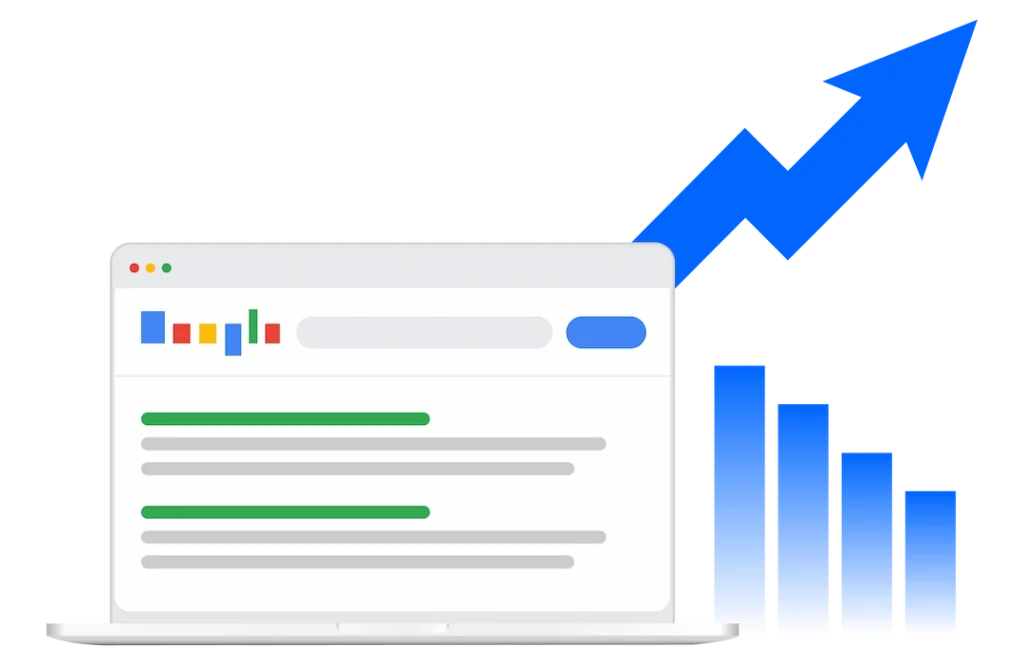For this part in our series about what successful data looks like, we’re looking into Google Ads data. Come with us and discover what our Google Ads experts think you should be looking at to identify a successful advertising campaign.
About Google Advertising
Google Ads is an established, effective way to advertise your business’s products or services online. Advertisers create engaging adverts in a range of formats, from simple text based ads to long form video ads. These ads then appear on a variety of Google placements, including Google search results, YouTube, Gmail and a variety of Google Partnered websites and apps.
Google Ads uses a bidding system where each advertiser bids against each other in the style of an auction. Essentially, the advertiser will set their bid price. This will either dictate how much they are willing to spend per click on the advert, or how much they are willing to spend for the advert to appear 1000 times.
Cost per click is determined based on the quality score of the campaign as well as your competitors bid price. For this reason, densely populated areas with more competition will have a higher cost per click than more rural areas.

Key Performance Metrics
Impressions: How many times your ad appears on a user’s screen. This does not mean they have actually seen it.
Clicks: The number of times a user has clicked on an ad.
CTR%: The number of clicks divided by the number of impressions. This provides insight into the effectiveness of your ad text and the relevance of your keywords. A higher click through rate will indicate an effective ad. Usually a good CTR will be between 2 and 5%.
Conversions: The number of useful actions you received after an advert interaction.
Avg. CPC: The amount you’ve paid for your ad divided by its total clicks.
How Do We Measure Success?
A business’s objective can influence which type of campaign they create and run through Google Ads. The success of a Google Ads campaign will depend on the overall objective and goal of the advertiser. Commonly, advertisers will focus on one specific goals and markers of success. This can be broken down into the following metrics:
- Clicks
- Impressions
- Conversions
- Impression Share
Website Traffic
A goal of increasing website traffic means that you’re aiming to increase the number of users visiting your businesses website. You might want to promote certain pages on the website, or increase general awareness of your brand. Using Keywords, Audience Segments and Placements, adverts can be optimised to appear in front of users who are interested in what your business has to offer. This maximises the amount of relevant traffic that reaches the website.

If increasing website traffic is your goal, an effective way to achieve this is to get your advertisements in front of users that are searching for your services. This will create an increase in traffic to your website for keywords that you may not rank for organically. Website traffic is measured on the number of ‘Clicks’ that the advert receives.
Branding & Awareness
Generally, the number of impressions or impression share (how often your advert has appeared) will be a measure of success for Display campaigns, where the main focus of the campaign revolves around Brand Awareness and Consideration. While the number of clicks and conversions may appear low, it’s important to remember that the main aim of this type of campaign is to put your advert and brand in front of as many users as possible. When users are exposed to your branding repeatedly, they begin to recognise you and start to build a relationship with your brand.
Leads
Leads campaigns rely heavily on conversion tracking. Conversions are recorded when a certain action is performed either on a website, advert or Google hosted platform. You can decide what action is considered to be a conversion based on what the goal of your campaign is. It may not always be a sale. Some websites will consider a phone call, email subscription or general enquiry to be a conversion. Conversions are the most important metric for a campaign where the goal is to generate leads or work out ROI.
Setting up conversion tracking will require a small amount of code to begin measuring what actions users are taking on your website. There are many different actions which can be tracked as conversions, such as phone number link clicks, mail link clicks and contact form submissions, among other things.

Sales
Sales is a set campaign objective within the Google Ads dashboard, typically used by businesses that want to promote certain products or services and to drive direct sales on their E-Commerce website.
A sales focused Google Ads campaign will typically be a search-based text advert that focuses on specific products, or a shopping advert. A search based text advert uses keywords and targeting to show in front of people actively searching for that product or service, whereas a shopping advert will pull products directly from the website’s inventory and display them on Google search results.
Is Your PPC Campaign Successful?
Measuring success when advertising on Google is highly dependent on your objective. When considering a Google Ads campaign you should already have in mind what the goal of the campaign is and then optimise the campaign for increased performance for its relevant metric.
Reap The Benefits Of PPC With Search4Local
If you want to take advantage of the benefits of a successful Google Ads PPC campaign, look no further than the trusted team at Search4Local. We can set up, target, analyse and fine tune your adverts and ensure you get the best value for money out of your campaign. Contact us today to discuss your needs with our team and get your adverts reaching your target audience.
Written by Matt Hughes




